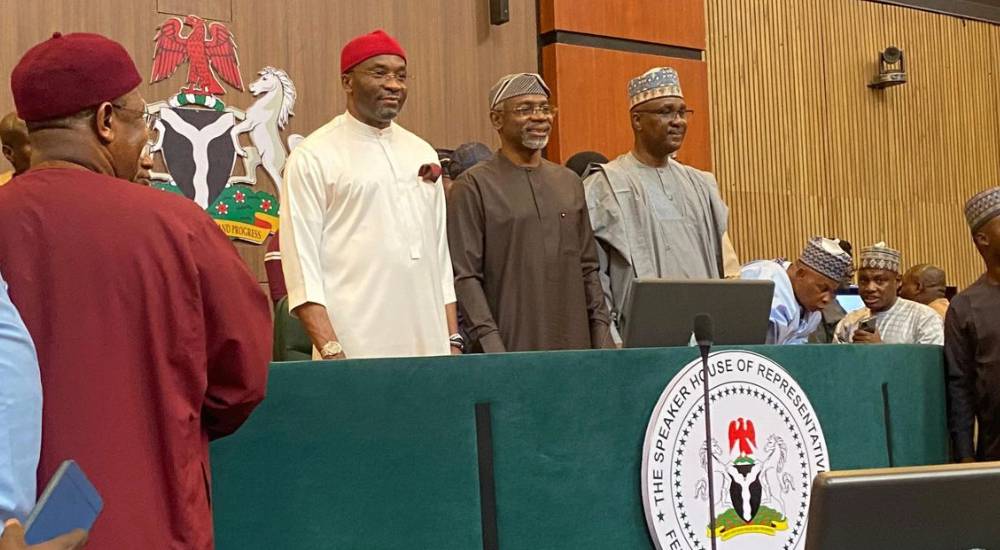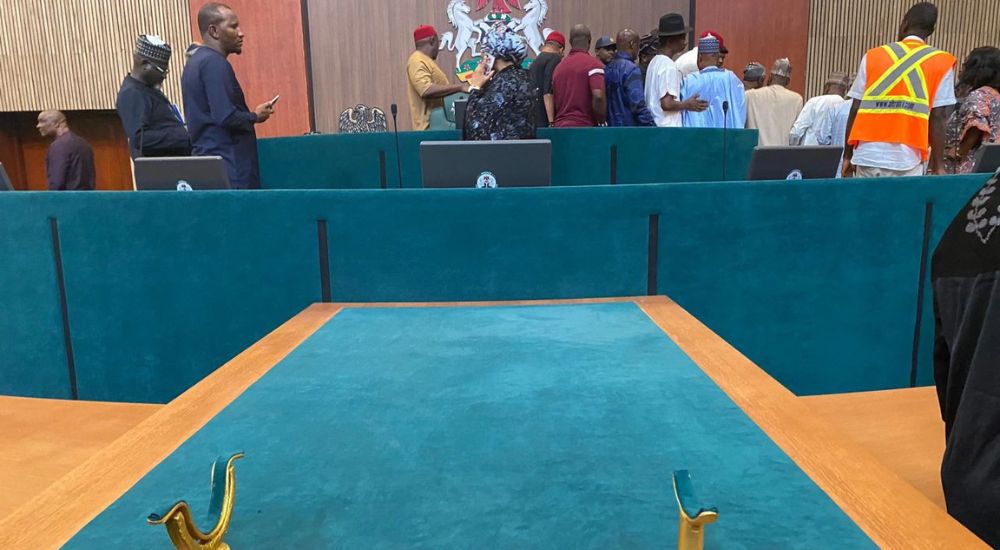“How are you coping with this fuel scarcity? Fuel queues everywhere. Even the bus stops are crowded. People waiting for buses that also do not have fuel.”
“What I don’t understand is why every administration since 1999, marking the return to civilian rule, has had to deal with exactly the same problems: fuel scarcity, a big debt burden, lack of electricity supply, unemployment, big corruption, terrorism and banditry. Sometimes, I take a look at this democracy and I am like: what really have we gained putting civilians in power?”
“The worst civilian government is better than the best military government.”
“I hear that all the time, yes. But why are we not making progress? Can you believe that one of my brothers had to contact me to ask if I could help get fuel. How am I supposed to do that from Lagos, when I am also looking for fuel.”
“Don’t worry when the Dangote refinery starts producing PMS and the Warri refinery kicks off, everything will be fine.”
“I have been hearing that for about a year. Were we not also told that the Port Harcourt Refinery has been mechanically completed? A mechanical refinery that has refused to produce petrol. We don’t need mechanical stories we want fuel at the filling stations”
“President Tinubu has advised us to be patient. At the Special Meeting of the World Economic Forum in Riyadh, Saudi Arabia, he told his audience that his government had to remove fuel subsidy and manage the foreign exchange market to prevent the country from slipping into bankruptcy.”
“I watched the video. He spoke well, ex tempore. He keeps doing a good job of marketing the country and selling the country as an important destination for Foreign Direct Investment. Good outing overall. You know City Boy is a show man. He met with the Dutch Prime Minister, Bill Gates, Chairman of shipping giant AP Moeller-Maersk, CEO of Samsung. But he didn’t tell the full story”
“Which full story do you want him to tell the international community? Which story?”
“He should have been honest enough to tell the business community that Nigeria under his watch is still a work in progress. Electricity supply is epileptic. Diesel is expensive. The cost of business is so high many businesses are leaving the country, the latest being PZ Cussons which has been in West Africa for more than 140 years. Even the businesses that are still in the country are raising prices. Multichoice has increased its subscription rates, effective May 1. The Telecom companies have also served notice that call rates will go up…”
“Market forces. Companies are doing business not charity. They have to make ends meet. For a business to be profitable, the Return on Investment (ROI) must be higher than the Cost of Investment. If you can’t afford to pay for Multichoice Premium, the same company offers you other options. If the Telcos increase their call rates, you simply talk less and reduce the number of calls you make.”
“But are you aware that one court has barred MultiChoice from increasing its subscription rates? And I guess the same thing will happen to the telcos. And if they cannot make ends meet, some of these companies will also close shop.”
“Just hearing that from you.”
“That is why I am talking about honesty. You are asking me to adjust and adapt. President Tinubu should have told his audience that back home IPMAN has announced that this fuel scarcity will linger for two weeks, further making life difficult for businesses and persons.”
“IPMAN talked about fuel scarcity and supply chain problems. The Independent Petroleum Marketers did not say there will be fuel queues for two weeks.”
“What is the difference?”
“So, what do you expect President Tinubu to do? To promise potential investors an enabling environment and then at the same time, de-market his own country? Trust is the biggest element in international trade. President Tinubu only needs potential investors to trust him. Or do you want him to behave like President Buhari who used to go abroad to tell people that Nigerian youths are lazy, or that a woman’s place belongs in the other room? Sorry, Tinubu is much smarter.”
“But why was he behaving like that during the campaigns making it look like he could not complete his sentences and had to be assisted to complete ordinary tasks like climbing the stairs. The same man is now energetic and bouncing, prancing, with energy and panache.”
“Strategy my friend. People underestimated Asiwaju Bola Tinubu, even within his own party. He outsmarted them all, even with the power of the tongue. Strategy is the soul of politics.”
“Okay, congratulations. Let him solve the problem of electricity, fuel supply, foreign exchange and the hunger in the land. Soon, it will be May 29, one year since he assumed office. Enough of the promises of hope. I want action, results.”
“You have to be patient. You cannot expect Tinubu to fix eight years of maladministration in one year. But come to think of it, I think in a mysterious manner, Nigeria has just stumbled on a divine solution.”
“Beware of blasphemy. Leave God out of this. Our problems in Nigeria are man-made. Nobody should blame God.”
“I said divine. I didn’t mention God but you know God works through human beings. God has sent unto us one of his prophets to solve our problems.”
“And who is that?”
“Prophet Odumeje. Abidoshaker. Ganduka Gandusa. Indaboski. The Liquid Metal. The man has acquired powers. He says with his powers, he brought down the value of the dollar against the Naira and the Naira appreciated. But he left town for London with his powers, the Naira lost a little value and now that he is back, he will fix the Naira.”
“What powers?”
“Citadel. Pandemic. Epidemic. Pandemonium. Sanctus Sanitorias and Burning Fire.”
“Listen to that meaningless mumbo-jumbo. And who is Abido Shaker?”
“Man of God.”
“I think he is a clown. A comedian. An entertainer. I think he should be in Nollywood, not anywhere near a pulpit. You people worship pastors, not God. You actually believe that a prophet is the solution to Nigeria’s problems?”
“When the man went to London, people rushed to the airport to receive him. They even paid to watch him perform his latest song: Powers. He attracted a large crowd. When he returned to Nigeria, he was received by a large crowd, dancing and singing his praises. The man has his own style.”
“Nigerians like entertainment and that pastor is good at making skits. I am not surprised.”
“I hear he can use his powers to ensure steady electricity supply, generate employment and place Nigeria on the path of growth. You never know with these spiritualists. Don’t you think he should be consulted by the Nigerian government? Yemi Cardoso and Wale Edun can invite him to a meeting and explore ways of how his powers can be unleashed to fix monetary and fiscal policies.”
“He should be given a stern warning to stop misleading people. One of these days he would cause a pandemonium. The person that actually shocks me is that musician called Flavour. What does he hope to gain doing a collabo with Indaboski?”
“He probably hopes to get powers that would jump-start his musical career.”
“I sympathize with him if that is the case. He doesn’t need powers to do well as an artiste. Let him go and work hard on his talent and concentrate on his craft. Can’t he see that Indaboski is using him? Nonsense.”
“His choice. This is a free country. He is responsible for his own brand and identity. And in any case, I don’t think anybody is using anybody. They are both using each other. You will be surprised that their song may end up as a bestseller on the charts.”
“What I know is that people make stupid choices in this country. Like those young men who went to protest at the EFCC Headquarters yesterday. They turned EFCC vs. Alhaji Yahaya Bello into an Ebira youths vs Igalla youths conflict. I hear the protesters were ethnic gladiators.”
“Everything in Nigeria is always ethnicized. With so much unemployment in the country, you will always find more than enough idle youths to support any cause.”
“EFCC has already staged enough drama around this case. It should not get involved in Ebira or Igalla politics. The matter is already in court. The courts will decide on the weight of evidence provided. Enough of the circus and all you television lawyers should beware of running foul of the law.”
“I understand what you are saying. The part of the story that shocks me, actually, is the fact that people spend foreign currency in this country as if it were the national currency. The Chinese supermarket that was shut down in Abuja the other day, we were told designates items in Chinese and price tags in yen, not Naira. There are many schools, real estate companies, and luxury stores that transact business in dollars only.”
“Even some government agencies collect tariffs in dollars and claim that it is because their business is international. Nigeria’s crude oil is sold in dollars for example.”
“So, how do we expect the Naira to remain stable? I think what the American International School Abuja (AISA)’s involvement in the Bello case so far is that the government must move swiftly to outlaw the use of dollars for basic transactions in the country, instead of chasing people who are spraying small change at social parties.”
“Even that is an offence. There is no such thing as a small offence. The law is the law.”
“The law must be seen to be fair to all parties concerned. This is why I support the idea of a justice sector reform. For Heaven’s sake, we can’t even maintain correctional facilities. There was a small downpour the other day in Suleja and the perimeter wall of the correctional facility gave way. Over 100 inmates escaped. Before now, there have been jail breaks in Koton Karfe in Kogi state, Benin and Oko in Edo State, Kuje in FCT, and Okitipupa in Ondo State. Every incident has been traced to the poor management of the correctional facilities.”
“But what has this got to do with justice sector reform?”
“Everything. Justice administration is a chain from law enforcement to the judicial system to the custodial centres. There is no justice if the prisons are congested, if children are kept in maximum prison facilities, if security dogs are fed with N800 per day and inmates N700 per day. There is no justice when cases are delayed and the prisons are full of awaiting trial persons.”
“I am really sorry. I don’t want to talk about the plight of prisoners. Even those of us who are not in custodial centres are in prison in real terms. This country is a big prison yard.”
“I won’t put it like that. I guess we should at least be grateful for the little opportunities we get. There is nothing like being free, and having tomorrow to look forward to. Look at one example. The Edo State Government has just increased the minimum wage in the state to N70, 000. That is good news.”
“I hear Lagos has also done the same thing.”
“No. That story has been debunked by Gbenga Omotoso, the Lagos Commissioner for Information. What Lagos has in place is a comprehensive welfare programme called Eko Cares which covers food, healthcare and transportation.”
“Lagos can in fact pay up to N100, 000 if it so decides. Afterall, the Governor’s nickname is Sanwo Eko. Let him bring out the money. Sanwo Eko, show us the money. What is money?”
“Just confess that your sister works with the Lagos State Government and you want her to earn more.”
“There is nothing wrong with that. We are in a country where you have to look out for yourself.”
“This is why we are where we are”
“That is why Africa is the way it is.”
“Look at South Africa. Thirty years after the end of apartheid rule, the racist masters have been replaced by a local elite which has not really done much for the poor black majority. Our leaders in Africa only want power for power’s sake. If the ANC is not careful, it may not even get up to 40% in the May 29 elections. Obsession with power and corruption have broken up the party.”
“Typically African. South Africa after Mandela.”
“Look at Togo where the people went to the polls yesterday in a parliamentary election.”
“Is that an election? Faure Gnassingbe amended the Constitution to keep him in power till 2033. There is also the chance that he will remain President for life. He has been in power since 2005, the year that he seized power as birthright. His family has been ruling Togo since 1967.”
“The opposition parties do not stand any chance in Togo.”
“The Black man is the biggest problem to himself and to others.”





![[OPINION] Fuel Scarcity, Abidoshaker And Other Stories - Reuben Abati](/media/k2/items/cache/eb4971282d25474babd7e4263cab3722_Generic.jpg?t=20240513_032501)